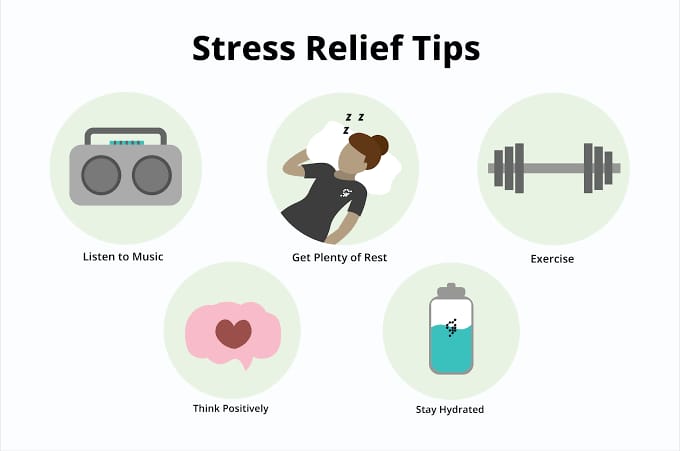
Stress, Sleep, and Self-Care: Overlooked Factors in Managing PCOS and PCOD
PCOS and PCOD are not just hormonal disorders but conditions deeply influenced by lifestyle. Stress, poor sleep, and lack of self-care worsen symptoms like weight gain, irregular cycles, and fatigue. Managing cortisol levels, practicing mindfulness, maintaining a healthy sleep routine, and prioritizing self-care habits improve hormone balance and emotional health.
💪 Fitness Guru
40 min read · 10, Sep 2025

Introduction
When it comes to managing PCOS (Polycystic Ovary Syndrome) and PCOD (Polycystic Ovarian Disease), most conversations revolve around diet, exercise, and medicines. While these are essential, many women overlook three powerful pillars of holistic health: stress management, quality sleep, and self-care. These hidden factors often determine whether lifestyle changes actually work or not.
Stress hormones disrupt reproductive health, poor sleep worsens insulin resistance, and neglecting self-care drains emotional energy. By addressing these overlooked areas, women can achieve better hormonal balance, regulate cycles, improve fertility, and boost overall well-being.
This article will guide you through the science behind stress, sleep, and self-care in PCOS/PCOD management, and provide daily, practical ways to implement them. Polycystic Ovary Syndrome (PCOS) and Polycystic Ovary Disorder (PCOD) are among the most common hormonal imbalances affecting women today, often linked with irregular periods, weight gain, infertility concerns, acne, hair growth in unwanted areas, and mood disturbances. Much of the conversation around PCOS and PCOD tends to focus on diet, exercise, and medication, which are undoubtedly important. However, there are certain silent yet powerful factors that often go unnoticed in the management of these conditions—stress, sleep, and self-care. These three elements may not sound as medical or scientific as prescriptions and treatment plans, but they influence hormonal health in profound ways. Ignoring them often means leaving an incomplete approach to healing, while acknowledging them can significantly improve overall well-being and long-term outcomes.
Stress plays a major role in aggravating hormonal imbalances. The body has a natural stress-response mechanism, releasing cortisol when it senses danger or pressure. While occasional stress is manageable, chronic stress keeps cortisol levels elevated, which interferes with insulin sensitivity and worsens symptoms of PCOS and PCOD. Insulin resistance, already a common feature of these conditions, gets further triggered when the body is under constant stress. This sets off a chain reaction that not only worsens weight gain but also disrupts ovulation and menstrual cycles. Emotional stress can also amplify mood swings, anxiety, and depression that many women with PCOS report. What makes stress tricky is that it is often dismissed as a part of modern life, something inevitable and unworthy of attention. Yet, learning to manage it consciously can make a remarkable difference. Practices such as meditation, yoga, mindful breathing, journaling, or simply taking breaks for hobbies are not luxuries; they are necessities for women dealing with hormonal imbalances.
Closely linked with stress is sleep, another underestimated pillar of health. Sleep is not just rest; it is the body’s time to repair, balance hormones, and regulate metabolism. When women with PCOS and PCOD do not get enough sleep or experience poor-quality sleep, the body struggles with regulating insulin and reproductive hormones like estrogen and progesterone. Research has shown that women with these conditions are more prone to sleep disturbances, including sleep apnea, which further disrupts hormone balance. Poor sleep also increases cravings for sugar and refined carbohydrates, fueling weight gain and worsening insulin resistance. On the other hand, good sleep habits can act as natural therapy. Creating a routine where one goes to bed and wakes up at the same time every day, avoiding late-night screen exposure, keeping the bedroom cool and dark, and practicing a relaxing pre-sleep ritual such as reading or light stretching can help the body slip into restorative rest. Even small improvements in sleep patterns can lead to noticeable changes in mood stability, energy levels, and menstrual regularity.
The third, often overlooked factor is self-care. Self-care does not only mean skincare routines or spa days; it refers to intentionally nurturing both body and mind in ways that promote long-term balance. Women with PCOS and PCOD often struggle with low self-esteem due to weight issues, acne, or hair growth. This can create a cycle of self-criticism and emotional withdrawal, which only adds to stress and poor lifestyle choices. Self-care here becomes a practice of compassion towards oneself, where acceptance and gentle care replace harsh judgment. For example, nourishing the body with wholesome meals rather than crash diets, engaging in joyful physical activities rather than punishing workouts, or practicing affirmations and gratitude can slowly transform the way one relates to the condition. Self-care also involves regular medical checkups, listening to the body’s signals, and not ignoring emotional well-being. Therapy, support groups, or simply speaking openly with loved ones about struggles can ease the mental burden.
When stress management, sleep, and self-care come together, they create a strong foundation for better management of PCOS and PCOD. Women who consciously reduce stress are more likely to see improvements in weight control, menstrual regularity, and mood. Those who prioritize sleep find their energy and metabolism improving, making it easier to stay consistent with diet and exercise. And women who embrace self-care gradually rebuild a positive relationship with their bodies, reducing the guilt and shame that often surrounds these conditions. It is not about perfection but about consistency. Ten minutes of meditation daily, ensuring seven to eight hours of restful sleep, and practicing self-kindness can collectively create a ripple effect of healing.
It is also worth noting that these three overlooked factors are interconnected. Stress disrupts sleep, poor sleep increases stress, and neglecting self-care makes both worse. Conversely, managing stress supports better sleep, good sleep makes one more resilient to stress, and self-care practices encourage healthier lifestyle habits. This interconnectedness is why they should never be seen as optional extras but as central parts of any management plan. Medication, diet, and exercise will always be important, but without stress control, sleep hygiene, and self-compassion, they can only achieve limited results.
In today’s fast-paced world, many women push themselves to be productive, to meet expectations at work, at home, and in society. PCOS and PCOD can feel like obstacles in this journey, creating frustration and feelings of inadequacy. But by shifting focus to the quieter aspects of health—managing stress wisely, sleeping deeply, and practicing genuine self-care—women can regain a sense of control and harmony. These practices do not promise instant fixes, but they build resilience, improve hormonal balance, and support sustainable healing over time. The beauty of this approach lies in its accessibility: everyone can practice mindful breathing, create a soothing bedtime ritual, or speak kindly to themselves without needing expensive interventions.
Ultimately, managing PCOS and PCOD is about balance, not just in hormones but in lifestyle and mindset. Stress, sleep, and self-care are often overlooked because they seem simple compared to medical treatments, but it is their simplicity that makes them powerful. By embracing these factors, women can move beyond just coping with their condition and start thriving with it. Healing becomes not just about controlling symptoms but about living fully, peacefully, and confidently with a body that is cared for and respected.
Understanding PCOS and PCOD Beyond Diet and Exercise
PCOS/PCOD are hormonal imbalances that affect the ovaries and metabolism. Symptoms include irregular periods, weight gain, acne, excess hair growth, and fertility challenges. While food and fitness play major roles, they don’t exist in isolation. Hormones like cortisol (stress hormone), melatonin (sleep hormone), and serotonin (mood regulator) also impact how the body handles insulin, ovulation, and inflammation.
Ignoring these aspects can lead to:
- More severe period irregularities
- Increased insulin resistance
- Weight gain despite diet and workouts
- Mood swings and low self-esteem
- Higher risk of anxiety and depression
Thus, managing PCOS requires a mind-body approach, not just a calorie count.
The Role of Stress in PCOS and PCOD
Chronic stress is like pouring fuel on the fire of hormonal imbalance.
- Cortisol and Hormonal Imbalance
- When stress increases cortisol, it interferes with reproductive hormones. This worsens irregular cycles and ovulation issues.
- Stress and Insulin Resistance
- Stress raises blood sugar levels, increasing insulin resistance—a major PCOS trigger.
- Stress and Inflammation
- Long-term stress increases inflammation, leading to acne, bloating, and weight gain.
- Emotional Eating
- Stress often triggers cravings for sugary, fried, or processed foods, which worsen PCOS symptoms.
Stress Management Tips:
- Practice deep breathing for 5 minutes daily.
- Try yoga or stretching exercises.
- Keep a gratitude journal.
- Limit negative screen time and toxic social media scrolling.
The Role of Sleep in PCOS and PCOD
Sleep is not just rest—it’s when the body heals and balances hormones.
- Poor Sleep and Insulin Resistance
- Studies show that lack of sleep worsens insulin resistance, making it harder to lose weight.
- Melatonin and Reproductive Health
- Good sleep boosts melatonin, which influences ovulation and egg health.
- Sleep and Cravings
- When you don’t sleep well, ghrelin (hunger hormone) rises and leptin (satiety hormone) drops, leading to overeating.
- Sleep and Mental Health
- Poor sleep worsens mood swings, anxiety, and depression—already common in PCOS.
Sleep Hygiene Tips:
- Sleep 7–9 hours every night.
- Maintain a consistent bedtime and wake-up time.
- Avoid screens 1 hour before bed.
- Drink warm chamomile or tulsi tea before sleep.
- Keep your bedroom cool, dark, and quiet.
The Role of Self-Care in PCOS and PCOD
Self-care is not luxury—it’s therapy for women with PCOS/PCOD. It builds resilience, reduces stress, and boosts confidence.
- Emotional Self-Care
- Spending time on hobbies, journaling, or meditation reduces anxiety and emotional eating.
- Physical Self-Care
- Massage, skincare, and mindful movement improve blood circulation, boost self-esteem, and reduce cortisol.
- Social Self-Care
- Connecting with friends, support groups, or therapy helps release emotional burden.
- Restorative Self-Care
- Allowing yourself guilt-free rest days prevents burnout.
Simple Self-Care Ideas:
- Take a relaxing bath with Epsom salt.
- Read or paint for 30 minutes.
- Spend time in sunlight for vitamin D.
- Treat yourself to a healthy homemade smoothie.
- Say “no” to unnecessary commitments that drain you.
How Stress, Sleep, and Self-Care Work Together
These three factors are interlinked:
- Stress disrupts sleep; lack of sleep raises stress.
- Poor self-care habits increase both stress and sleeplessness.
- When stress and sleep are balanced, the body responds better to diet, exercise, and medication.
Together, they form the foundation of hormonal healing.
Daily Practices for PCOS and PCOD Wellness
Morning Routine
- Wake up at the same time daily.
- Drink warm water with lemon or cinnamon.
- Practice 5 minutes of meditation or affirmations.
- Do light exercise like yoga or a walk.
Midday Boost
- Take a 10-minute break from work/study to stretch.
- Eat a balanced lunch rich in protein and fiber.
- Step outside for sunlight exposure.
Evening Ritual
- Do 15–20 minutes of light activity after dinner.
- Journal thoughts or gratitude notes.
- Avoid caffeine or heavy meals before bed.
Night Routine
- Keep your phone away 30–60 minutes before sleep.
- Dim the lights and listen to calming music.
- Sleep early to align with your body’s circadian rhythm.
Weekly Self-Care and Stress Relief Practices
- Dedicate one day to meal prep to avoid junk cravings.
- Schedule a relaxing activity like painting, dance, or gardening.
- Do one “unplugged evening” without social media.
- Try a 20-minute home spa session with a face mask or foot soak.
- Meet a close friend or talk to a supportive loved one.
- Practice yoga nidra or guided meditation once a week.
Common Challenges and Prevention Tips
Irregular Sleep Schedule
→ Prevention: Fix wake-up time first, bedtime will adjust automatically.
High Stress from Work/Studies
→ Prevention: Use “Pomodoro breaks”—25 min work + 5 min relaxation.
Emotional Eating During Stress
→ Prevention: Keep healthy snacks like nuts, fruits, or dark chocolate nearby.
Skipping Self-Care Due to Guilt
→ Prevention: Remember self-care is productive because it fuels long-term health.
Myths About PCOS Management: Busted!
“Only diet and exercise matter in PCOS.”
→ False. Stress, sleep, and self-care are equally crucial.
“Sleep doesn’t affect hormones.”
→ Wrong. Sleep regulates melatonin, insulin, and reproductive hormones.
“Self-care is selfish.”
→ Not true. Self-care helps you stay emotionally strong to handle life better.
“Stress is normal, nothing can be done.”
→ False. Stress can be managed with mindfulness, hobbies, and relaxation practices.
“If I take medicine, lifestyle doesn’t matter.”
→ Incorrect. Medicine works best when paired with balanced lifestyle habits.
Sample Holistic Day for PCOS and PCOD Management
- Morning: Wake up, meditate, walk, eat a protein-rich breakfast.
- Afternoon: Work with breaks, hydrate, eat fiber-rich lunch, get 10 mins sun.
- Evening: Light activity, hobby time, or journaling.
- Night: Herbal tea, gratitude note, screen-free wind down, sleep by 10:30–11 pm.
Conclusion
PCOS and PCOD are not just physical conditions—they deeply affect the mind and emotions too. While diet and exercise are important, true healing happens when you also care for your mental, emotional, and sleep health.
Managing stress keeps cortisol under control, quality sleep restores hormonal balance, and self-care nurtures confidence and resilience. Together, they make other lifestyle changes more effective, giving you better results and long-term relief.
So the next time you think about PCOS management, remember: it’s not just about what you eat or how you move, but also how you rest, relax, and care for yourself.
Start today with one small change—sleep earlier, meditate for five minutes, or write in a journal. Over time, these overlooked habits will bring balance, healing, and a more peaceful journey with PCOS/PCOD.
Q&A Section
Q1:- How does stress influence PCOS and PCOD symptoms?
Ans :- Stress triggers hormonal imbalances by elevating cortisol, which worsens insulin resistance, irregular cycles, and inflammation, making PCOS and PCOD symptoms more severe.
Q2:- Why is quality sleep important for women with PCOS and PCOD?
Ans :- Proper sleep regulates insulin, hormones, and metabolism. Poor sleep increases cravings, weight gain, and worsens irregular periods and fatigue in women with PCOS/PCOD.
Q3:- What role does self-care play in managing PCOS and PCOD?
Ans :- Self-care practices such as balanced diet, exercise, mindfulness, and skincare reduce stress, support hormone regulation, and improve overall well-being.
Q4:- How does lack of sleep affect insulin resistance in PCOS?
Ans :- Inadequate sleep raises blood sugar levels, increases insulin resistance, and promotes fat storage, which worsens PCOS symptoms like weight gain and irregular periods.
Q5:- Can stress management techniques improve PCOS/PCOD outcomes?
Ans :- Yes, practices like yoga, meditation, journaling, and deep breathing lower cortisol, enhance mood, and balance reproductive hormones for better symptom control.
Q6:- Why do women with PCOS often face sleep disturbances like insomnia or sleep apnea?
Ans :- Hormonal imbalance, obesity, and stress contribute to sleep problems, including sleep apnea and insomnia, making PCOS management more challenging.
Q7:- What are simple self-care tips to reduce PCOS/PCOD stress levels?
Ans :- Engaging in hobbies, walking in nature, reducing screen time, practicing gratitude, and prioritizing rest help lower stress and promote hormonal balance.
Q8:- How does mindfulness help in PCOS and PCOD management?
Ans :- Mindfulness reduces anxiety, improves emotional resilience, and promotes healthier eating and lifestyle habits, which directly support hormone balance.
Q9:- Why is consistency in sleep routine important for PCOS women?
Ans :- A fixed sleep schedule stabilizes circadian rhythm, supports metabolism, and balances reproductive hormones, easing irregular cycle patterns.
Q10:- How can integrating stress, sleep, and self-care improve PCOS/PCOD treatment alongside medication?
Ans :- Combining medication with stress reduction, proper sleep, and holistic self-care creates a stronger management plan that controls symptoms and enhances quality of life.
Similar Articles
Find more relatable content in similar Articles

Military Fitness Secrets the Public Doesn’t Know...
“Discover the hidden methods b.. Read More

Survival Fitness – Training Your Body for Natural Disasters...
Survival fitness equips your b.. Read More

Circadian Rhythm Fitness – Matching Workouts with Your Inter..
“Discover how aligning your wo.. Read More

5 Common Skincare Routine Mistakes That Damage Your Skin (A..
A good skincare routine keeps.. Read More
© 2024 Copyrights by rFitness. All Rights Reserved.